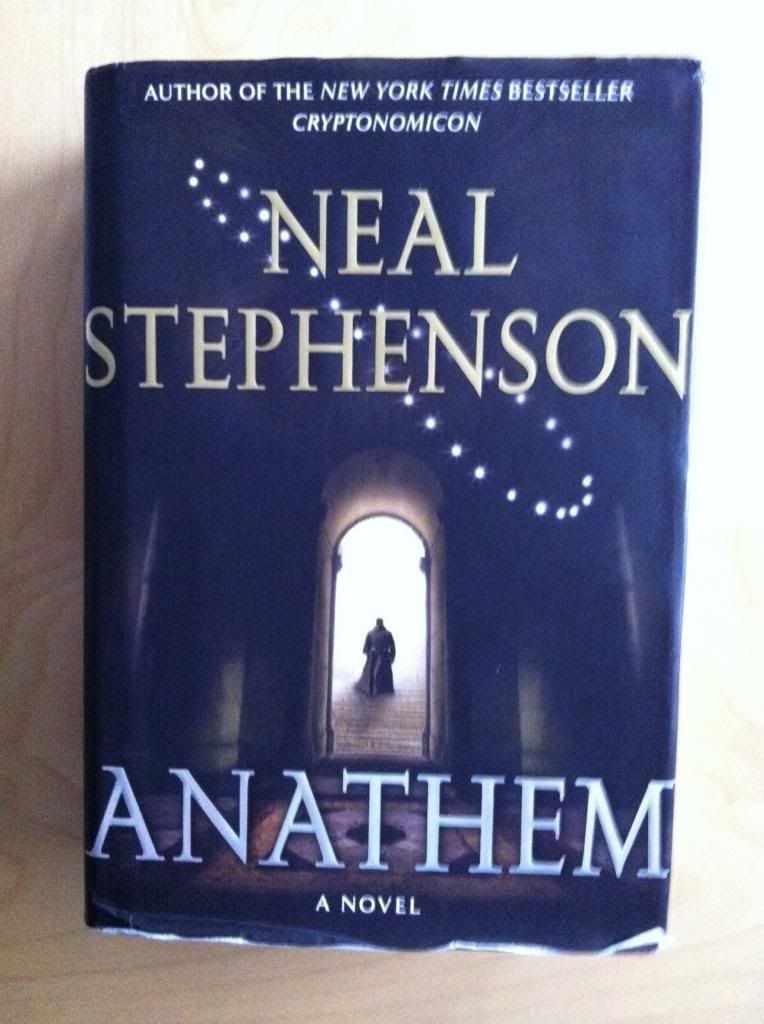Or why you should read Anathem by Neal Stephenson
Finding a favourite novel is an intensely personal experience. People, all of us, are these exquisitely complex beings made of the interplay of nature (genetics, epigenetics, poorly understood other-RNA-stuff, regulatory protein behaviours, etc) and nurture, that unique set of environmental conditions and experiences that shaped our biology until we end up who we are. We each, as a result, carry our own spectrum of interests and hobbies and experiences which in turn act as the masonry of our perspectives. And so we are all primed to experience, well, everything but for the sake of this: fiction in radically different ways. Which is all a long winded way of getting at the idea that finding that perfect novel, that matrix of ideas and themes and story that just ineffably and perfectly connects to us, is this incredible accident of... for lack of a better way to put it, alignment that it is a kind of magic.
Anathem by Neal Stephenson is maybe my favourite novel.
Anathem is a difficult book to talk about from a plot perspective since so much of its power revolves around the act of discovery. It is very much a novel that throws you into a new world and walks the perfect line between providing enough exposition to understand the context of the fiction, while also leaving subtext open to interpretation, deduction, and theorizing. Anathem is a story about exploration and discovery where is also along on a journey of exploration and discovery. Which is pretty great.
What I can say about the the story of Anathem is that it takes place at a time when society is split between the general population, the saecular world, and the world of academia, The Mathic world. Essentially, in Anathem, academia, particularly science academia, has been literally walled off from everyone else in monastery like cloisters called Concents where they practice a humble ascetic lifestyle and pursue their studies with the limited tools allowed them. These Concents are also divided within themselves with gated quadrants, called Maths, that only open annually, once a decade, once a century, or once a millenia with each group kept seperated from the larger society as well as one another. Anathem focuses on Erasmus, a young Fra in the Decenarian Math of the Concent of Saunt Edhar on the cusp of adulthood and choosing his special area of study. However, this is thrown out of order when his teacher, the astronomer Orolo, makes a startling observation shortly before Apert, when the gates between the Decenarian Math and the Saecular world are due to briefly open. An observation with great implications for both the Mathic and Saecular worlds that promises great discovery and threatens far reaching discord.
(Which maybe sounds a little dry, but trust me, there is adventure and romance and action to be had amongst the smart stuff.)
The reason why this novel might be my favourite is that I find it both eminently relatable and deeply fascinating from a thematic standpoint. For all of the Science Fiction particulars and story developments, Anathem is also a very thorough and thoughtful meditation on the Philosophy of Science and the relationship between Society at Large and Academia. The Mathic world functions as this amazing metaphor for Science Academia, and is used in the novel as a machine to explore the formative norms of the Science as well as the complicated, fraught relationship between ordinary people and Science Academics. As a dude in the midst of a PhD in the Life Sciences who has an extremely wankery fascination with how Science functions as a philosophy and the history of Science I find this super cool. Which makes this book immently relatable and endlessly fascinating to me. As great and engrossing a story as Anathem is, I just absolutely love this aspect of the novel. It feels like Anathem was written just for me.
I would recommend this book for me: it is the perfect alignment of my interests with a fantastic story. It's absolutely perfect for me. Can I recommend it for other people who are not me? Well, it's hard to say. It's a very well written book with rich characters, some great high concepts, and a really epic plot. And the way it opens up as a process of discovery is just incredible. But Anathem is also a very long novel (~900 pages) and can get pretty conceptually dense at times. While it was an investment in time for me, it felt effortless and breezy... but I'm me and I love this book. It is very hard for me to be objective about Anathem, but I'd say if you are a Science student who likes Sci-fi you will certainly enjoy the novel. Anathem would also be a good call for any fan of Neal Stephenson or anyone who likes well written, wicked smart, contemporary Science Fiction.
Previously:
Snow Crash and Diamond Age
Reamde

No comments:
Post a Comment